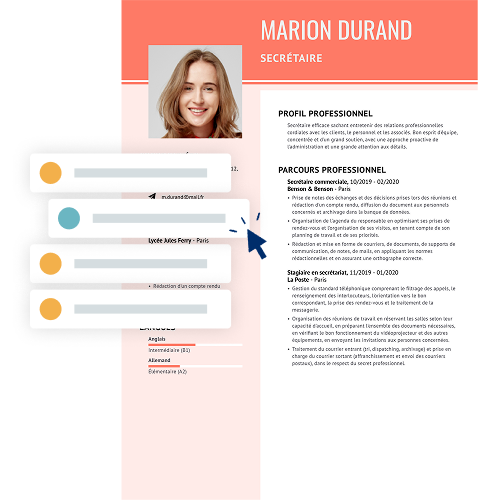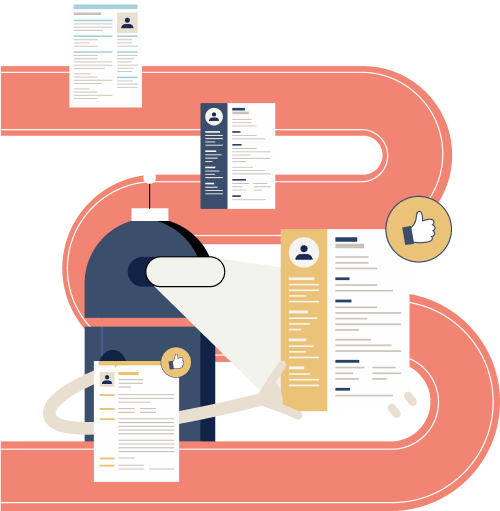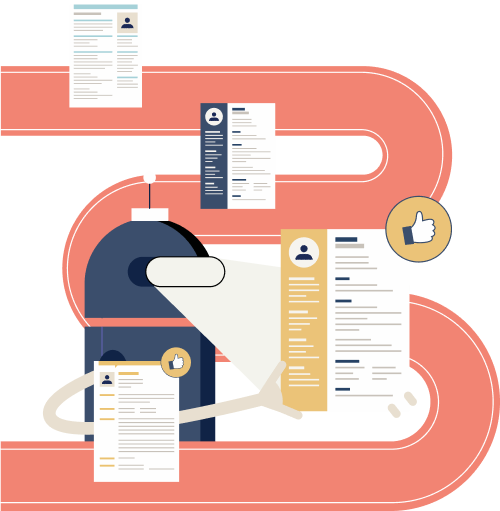Careers Where AI Skills Give You a Huge Advantage
We’ve identified the careers where AI knowledge isn’t just a bonus — it’s a game-changer for getting hired, earning more, and future-proofing your career. See which roles are in demand, which are set to grow and how to make AI skills your biggest competitive advantage.


Our customers have been hired by: *Foot Note
Top AI skills for career growth: current and future job roles
Artificial intelligence is reshaping the workplace, making it an essential skill set across many industries. We’ve identified both current and emerging careers where AI skills give you a clear edge. Some of these careers are already in demand, while others are set for rapid growth as AI integration accelerates.
Why AI skills matter
- Increases your chances of being shortlisted for roles
- Can boost your salary potential
- Helps you work smarter and adapt faster
- Opens doors to more diverse career options
- Signals adaptability and technical capability to employers
AI skills by the numbers
- Nearly 80% of the world’s largest companies now use AI in at least one business function.
- UK job postings requiring AI skills are growing 3.6 times faster than average job ads.
- Employers are willing to pay around 14% more for candidates with proven AI expertise.
Careers benefiting from AI skills
Employers are increasingly seeking candidates who can use AI tools. Below is a list of roles where AI knowledge can make you stand out and improve your chances of landing the job.
If you are preparing to apply for one of these positions, our CV templates can help you showcase your skills effectively and highlight your AI expertise.
Data Scientist / Data Analyst
- What it is: Data scientists and analysts collect, process, and interpret large datasets, both structured and unstructured, to support strategic decision-making. They create predictive models, visualise insights, and help businesses identify trends and opportunities.
- Why AI matters: AI accelerates data analysis, enabling faster and more accurate insights that would otherwise take much longer to uncover manually.
- How AI skills make you stand out: Mastery of AI-powered analytics tools shows employers you can extract actionable insights faster, automate reporting, and handle more complex datasets than competitors.
- UK salary: Average around £49,000, typical range between £39,000 and £63,000, with top earners up to £98,400 (glassdoor.co.uk).
Digital Marketing Specialist
- What it is: Digital marketing specialists design and manage campaigns across platforms such as search, email, and social media, using data to optimise reach and engagement. They combine analytical thinking with creative messaging to enhance brand presence.
- Why AI matters: AI enables hyper-targeted advertising, dynamic content personalisation, and automated campaign optimisation that improves efficiency and impact.
- How AI skills make you stand out: Experience with AI-driven marketing platforms signals you can deliver higher ROI campaigns, personalise content at scale, and make data-backed creative decisions.
- UK salary: Average around £37,100 annually, with top earners up to £67,800 (glassdoor.co.uk).
Software Developer / AI Engineer
- What it is: Software developers build applications and systems, while AI engineers specialise in developing, training, and integrating machine learning models into those systems. They work across industries to bring AI functionality into everyday software.
- Why AI matters: AI frameworks now underpin features such as recommendation systems, automation, and predictive user experiences.
- How AI skills make you stand out: Demonstrating fluency with AI/ML frameworks shows you can create smarter, more adaptive products that improve user engagement and operational efficiency.
- UK salary: Median around £44,100, with a typical range of £33,396 to £59,237, and top earners up to £78,900 (glassdoor.co.uk).
Cybersecurity Specialist
- What it is: Cybersecurity specialists protect organisations against digital threats by monitoring systems, detecting vulnerabilities, and responding to breaches. They design defence protocols and ensure data security.
- Why AI matters: AI enhances threat detection, anomaly spotting, and automated incident response, providing faster and more effective protection.
- How AI skills make you stand out: Employers value candidates who can deploy AI-powered security tools to detect emerging threats sooner and respond in real time.
- UK salary: Average around £58,240, with a typical range of £43,501 to £79,153 (glassdoor.co.uk).
Healthcare Professional (Radiologist, Nurse Informaticist)
- What it is: Healthcare professionals deliver diagnosis, treatment, and patient care, while nurse informaticists manage digital patient data systems. Radiologists interpret medical imaging to make critical clinical decisions.
- Why AI matters: AI supports accurate image analysis, patient monitoring, and treatment planning, enhancing clinical decision-making and patient outcomes.
- How AI skills make you stand out: Understanding AI diagnostic tools shows you can work more effectively with technology to improve accuracy, speed, and patient experience.
- UK salary: For a radiologist salary can range from £36,616 to £107,155 depending on specialisation and seniority. (prospects.ac.uk)
Project Manager
- What it is: Project managers coordinate planning, execution, and delivery of projects, ensuring they meet objectives on time and within budget. They manage resources, risks, and stakeholder communication.
- Why AI matters: AI-powered tools improve scheduling, resource allocation, and risk forecasting, enabling more efficient and informed project management.
- How AI skills make you stand out: Being able to implement AI project management tools shows you can deliver projects more efficiently and make data-driven decisions that minimise risk.
- UK salary: Average around £52,500, with mid-range between £45k and £60k, and senior roles exceeding £85k (apm.org.uk).
Customer Experience Manager
- What it is: Customer experience managers shape the interactions customers have with a brand, identifying pain points and opportunities to improve satisfaction. They design strategies to build loyalty and enhance service delivery.
- Why AI matters: AI can analyse customer sentiment, personalise communications, and predict needs to improve experiences at scale.
- How AI skills make you stand out: Proficiency with AI-driven CRM and analytics platforms shows you can deliver personalised, proactive customer service that strengthens brand loyalty.
- UK salary: Average around £35,300, with a typical range of £25,427 to £51,230, and top earners up to £76,277 (glassdoor.co.uk).
Financial Analyst
- What it is: Financial analysts evaluate financial data, create forecasts, and provide strategic guidance to support investment and business decisions. They monitor market trends and assess company performance.
- Why AI matters: AI tools enhance modelling, risk analysis, and prediction, allowing analysts to respond to market changes more quickly.
- How AI skills make you stand out: Showing you can use AI for faster, more accurate market and risk analysis positions you as a forward-thinking and data-savvy finance professional.
- UK salary: Average around £40,000, with a typical range of £42,500 to £77,600 depending on seniority (glassdoor.co.uk).
Content Writer
- What it is: Content writers produce articles, website copy, and marketing materials that inform, engage, and persuade audiences. They research topics, adapt tone to brand voice, and ensure accuracy and clarity.
- Why AI matters: AI tools help writers generate ideas, structure content, optimise for SEO, and streamline editing processes, allowing them to work faster without sacrificing quality.
- How AI skills make you stand out: Knowledge of AI writing and SEO optimisation tools shows you can produce higher volumes of targeted, high-quality content in less time.
- UK salary: Typically around £28,160 per year, with most earnings between £22,300 and £36,400 (glassdoor.co.uk).
Machine Learning Engineer
- What it is: Machine learning engineers design, build, and optimise algorithms that enable systems to learn from data and improve over time without explicit programming. They work closely with data scientists to move models from experimental phases into production environments.
- Why AI matters: Machine learning is the foundation of many AI applications, powering everything from recommendation systems to fraud detection and language modelling in NLP specialist roles.
- How AI skills make you stand out: Expertise in machine learning frameworks, coupled with the ability to fine-tune and deploy models at scale, shows employers you can create high-performance AI systems that directly impact business outcomes.
- UK Salary: Average around £58,000, with typical ranges between £45,000 and £80,000 (glassdoor.co.uk).
Business Analyst
- What it is: Business analysts evaluate organisational processes, identify areas for improvement, and recommend solutions that align with business goals. They bridge the gap between technical teams and business stakeholders to ensure solutions meet both operational and strategic needs.
- Why AI matters: AI can process and analyse large volumes of operational data quickly, uncovering patterns and efficiencies that are not visible through traditional analysis.
- How AI skills make you stand out: Using AI-powered business intelligence and process mining tools shows employers you can generate faster, deeper insights and recommend data-backed improvements.
- UK salary: Average around £42,000, with most roles ranging between £33,000 and £56,000 (glassdoor.co.uk).
Human Resources Specialist / HR Manager
- What it is: HR specialists and managers oversee recruitment, employee relations, training, and organisational development. They play a central role in building and maintaining an engaged, productive workforce.
- Why AI matters: AI tools can automate candidate screening, analyse workforce data for trends, and personalise employee development plans.
- How AI skills make you stand out: Experience with AI-driven applicant tracking systems and HR analytics platforms demonstrates you can hire more effectively and improve retention strategies.
- UK salary: Average around £43,000, with most roles between £32,000 and £60,000 (glassdoor.co.uk).
Supply Chain Manager
- What it is: Supply chain managers coordinate the end-to-end process of moving goods from suppliers to customers, ensuring efficiency, cost control, and timely delivery. They manage procurement, logistics, and inventory control.
- Why AI matters: AI enables real-time demand forecasting, route optimisation, and automated inventory management, reducing costs and improving service levels.
- How AI skills make you stand out: Proficiency with AI-based supply chain planning tools shows you can anticipate disruptions, optimise resources, and improve operational agility.
- UK salary: Average around £50,000, with most salaries ranging from £38,000 to £70,000 (glassdoor.co.uk).
Future careers in AI
Artificial intelligence is not only transforming today’s roles but also creating entirely new career opportunities. As AI technologies mature and expand into more industries, demand will grow for professionals who can bridge the gap between technical capability and real-world application. These emerging roles may not yet be as widespread as current AI-enhanced careers, but they are rapidly gaining traction.
AI Product Manager
- What it is: AI product managers oversee the development and deployment of AI-powered products, from initial concept to launch and ongoing optimisation. They act as the bridge between technical teams, business stakeholders, and end users.
- Why AI matters: Understanding AI capabilities allows them to shape realistic product roadmaps and ensure that features deliver measurable value.
- How AI skills make you stand out: Showing you can translate complex AI technology into clear business benefits positions you as a leader who can drive both innovation and adoption.
- UK salary: Average around £58,800, ranging from £46,000 to £75,000, with top roles exceeding £92,000 (glassdoor.co.uk).
Prompt Engineer
- What it is: Prompt engineers craft and refine inputs that guide large language models and other generative AI systems to produce accurate, relevant, and creative outputs. They test and adapt prompts to optimise results for different use cases.
- Why AI matters: The quality of AI outputs depends heavily on how prompts are structured, making this skill set vital for effective AI use.
- How AI skills make you stand out: Demonstrating expertise in prompt engineering shows employers you can maximise AI performance for specific business needs and reduce time spent on revisions.
- UK salary: Average around £40,000, ranging from £30,100 to £52,900, with some roles paying up to £70,000 (glassdoor.co.uk).
AI Ethics Officer
- What it is: AI ethics officers ensure AI technologies are designed, deployed, and monitored in ways that are fair, transparent, and compliant with regulations. They assess the potential societal and legal impacts of AI systems.
- Why AI matters: Ethical governance is essential to building trust in AI and avoiding reputational or legal risks.
- How AI skills make you stand out: Being able to combine AI literacy with ethical frameworks demonstrates you can navigate both the technical and societal challenges of AI adoption.
- UK salary: Typically between £60,000 and £90,000 (xec.ai).
AI UX/UI Designer
- What it is: AI UX/UI designers create intuitive, user-friendly interfaces for AI-powered products and tools. They ensure the technology is accessible, functional, and aligned with user needs.
- Why AI matters: Designing for AI involves unique challenges, such as explaining AI decisions and enabling human-AI collaboration.
- How AI skills make you stand out: Combining design skills with an understanding of AI functionality shows you can create interfaces that make advanced technology easy and enjoyable to use.
- UK salary: Average around £46,000, ranging from £35,000 to £65,000 (glassdoor.co.uk).
Automation Workflow Designer
- What it is: Automation workflow designers build and optimise processes that use AI and automation tools to streamline repetitive tasks and improve efficiency. They work across teams to identify automation opportunities.
- Why AI matters: AI enhances automation workflows by enabling smarter decision-making, predictive triggers, and adaptive processes.
- How AI skills make you stand out: Showing you can implement AI-driven workflows demonstrates to employers that you can cut costs, save time, and free teams to focus on higher-value tasks.
- UK salary: Typically between £40,000 and £70,000 (glassdoor.co.uk).
Robotics Technician Specialist
- What it is: Robotics technician specialists install, maintain, and repair robotic systems, including those enhanced with AI for autonomous operation. They ensure the technology operates safely and efficiently.
- Why AI matters: AI-powered robotics requires specialised maintenance skills to keep adaptive, intelligent systems functioning at peak performance.
- How AI skills make you stand out: Proficiency with AI-enabled diagnostics and predictive maintenance tools shows you can prevent downtime and extend equipment lifespan.
- UK salary: Typically between £30,000 and £55,000 (glassdoor.co.uk).
Computer Vision Engineer
- What it is: Computer vision engineers are AI specialists who develop AI systems that can interpret and understand visual data from images or video. Their work supports applications such as autonomous driving, medical imaging, facial recognition, and quality inspection in manufacturing.
- Why AI matters: Computer vision is one of the fastest-growing AI fields, enabling machines to perform visual tasks with speed and accuracy that can exceed human capabilities in certain contexts.
- How AI skills make you stand out: Proficiency in computer vision frameworks, combined with knowledge of deep learning and image processing, demonstrates you can deliver AI-powered solutions that solve complex visual challenges.
- UK salary: Average around £52,000, with a range between £40,000 and £75,000 (Indeed.co.uk).
How to highlight AI skills on your CV
Having AI skills is valuable, and the easiest way to showcase them is through your CV — but they need to be placed in the right sections to have maximum impact. Many recruiters skim applications in seconds or use applicant tracking systems (ATS) to scan for relevant keywords. Positioning your AI skills throughout your CV will help ensure your CV isn’t ignored.

Where to showcase your AI skills:
- Mention AI capabilities in your CV summary
Your personal statement sits at the top of your CV, so it’s a good opportunity to quickly show recruiters you’re AI-proficient.
For example:
“Marketing professional with five years’ experience in campaign strategy and proven expertise in leveraging AI tools to optimise targeting, improve engagement, and drive measurable ROI.”
- List AI tools and platforms in your skills section
Including specific software or platforms you’re familiar with, such as ChatGPT, MidJourney, TensorFlow, in your CV skills section is an easy way to show recruiters you are AI savvy. - Show AI impact in your work experience
Your employment history is the ideal place to prove how you’ve applied AI skills to deliver results. Use clear, measurable achievements so recruiters can see the value you bring.
For example:
- Reduced reporting time by 30% using AI-powered data visualisation tools.
- Increased ad performance by 25% through AI-driven audience targeting.
- Highlight AI-related certifications and training
Your education section is the perfect place to show formal learning in AI. Including recognised certifications demonstrates credibility and shows employers that your knowledge is up to date.
By positioning your AI skills where it is most visible and linking them to proven outcomes, you make it easy for recruiters to see your value. You can explore our CV examples for further inspiration.
How recruiters use AI
Many employers now use artificial intelligence to manage applications, and understanding how it works can help you make sure your CV gets noticed. AI plays a role in both shortlisting candidates and ranking them, so if your CV is not optimised for these systems, it may never reach a human recruiter.

How AI is used in the hiring process:
- Applicant Tracking Systems (ATS) scan CVs for keywords and phrases that match the job description.
- AI ranking tools assess skills, qualifications, and experience to prioritise candidates.
- Screening chatbots may ask pre-interview questions to assess fit before scheduling with a recruiter.
- Pattern analysis is sometimes used to flag career gaps, check consistency, or evaluate progression.
What this means for your CV:
- Try to use some exact skills and terms found in the job description.
- Keep formatting simple so ATS software can read your CV correctly.
- Place your most relevant AI skills and achievements where they are easy to find.
Key takeaways
- AI skills are in demand now — employers in almost every industry are seeking candidates who can use AI to improve efficiency, solve problems, and make smarter decisions.
- Having AI proficiency can boost your earning potential — UK employers are willing to pay around 14% more for candidates with proven AI expertise.
- Certain careers offer a bigger advantage with AI skills — from data science to digital marketing, healthcare tech, and AI-focused product management, these roles are already benefiting from AI adoption. Many roles, like AI consulting, are emerging and will likely become important in the future.
- Your CV is your best tool to showcase AI skills — highlight them in your personal statement, skills section, work experience, and training to stand out to both recruiters and applicant tracking systems (ATS).
- Build an AI-ready CV easily. Use our CV builder to create an ATS-friendly CV that highlights your AI skills and makes you more competitive for high-demand roles.

Andrew Smith
Senior Content Writer
Meet Andrew Smith – an accomplished English copywriter with a strong background in SEO optimisation. Passionate about producing engaging content, Andrew has written across various fields, including health and fitness, security, travel, and tourism.
*The names and logos of the companies referred to above are all trademarks of their respective holders. Unless specifically stated otherwise, such references are not intended to imply any affiliation or association with myperfectCV.










